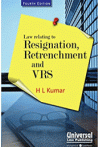- Author(s): H.L. Kumar
- Publisher: Universal LexisNexis
- Edition: 4 Ed 2016
- ISBN 13 9789350357699
- Approx. Pages 408 + contents
- Format Paperback
- Approx. Product Size 21 x 14 cms
- Delivery Time Normally 7-9 working days
- Shipping Charge Extra (see Shopping Cart)
.............................................................................................................................
Description
Resignation by an employee, must be with an intention to operate and unconditional. When an employee resigns his office, he formally relinquishes or withdraws from his office. It implies that he has taken a mental decision to sever his relationship with his employer and thereby put an end to the contract of service. The words “resignation" and "retirement" carry different meanings in common parlance. Also, there is a marked difference between "voluntary retirement", "resignation" and "retrenchment” as they convey different connotations. It has been held that voluntary retirement and resignation involve voluntary acts on the part of the employee to leave service and though both involve voluntary acts, they operate differently. One of the basic distinctions between the two is that in the case of resignation, it can be tendered at any time but in the case of voluntary retirement, it can only be sought for after rendering prescribed period of qualifying service. In the case of resignation, a prior permission is not mandatory while in the case of voluntary retirement, permission of the employer concerned is a requisite condition.
.............................................................................................................................
Contents
1. General
(1) What is 'Resignation'?
(2) Distinction between praesenti and prospective resignation
(3) Resignation by illiterate Person - the Competent Authority for its Acceptance to Ensure
whether it is under Coercion or Not.
(4) When Resignation becomes effective and can or cannot be withdrawn?
2. Withdrawal of Resignation before Acceptance
3. Necessity of Acceptance of Resignation
4. Resignation may be Voluntary, Express or Implied
5. Involuntary/Forced/Coerced Resignation amounts to wrongful termination of service
6. Miscellaneous
(1) Court can tear the veil to see whether the Resignation is Voluntary or not
(2) Whether an Employee can resign during his suspension period?
(3) Removal subsequent to resignation puts an end to resignation
(4) An employer cannot refuse to accept a resignation-unless the rules to be contrary
(5) When non-communication of acceptance does not make a resignation inoperative
(6) Benefits that a workman can or cannot claim on resignation
7. Voluntary Retirement Scheme (VRS) - An Introduction
(1) Voluntary Retirement - Meaning of
(2) Voluntary Retirement Scheme is different from retrenchment
(3) Voluntary Retirement is different from Compulsory Retirement
(4) Voluntary Retirement Schemes are Contractual in Nature
(5) Voluntary Retirement Scheme is Contractual in Nature and after Opting and
Acceptance of the Same, the Workman Loses Relationship of Employee
with the Management
(6) After Acceptance of Benefits under VRS, if a Workman Challenges the Same
with the Plea that he had Accepted the Same under Coercion and/or Threat,
he has to Return the Benefits of the Scheme
8. Notice of change for VRS
9. When an option for Voluntary Retirement can be withdrawn
10. When option for Voluntary Retirement cannot be withdrawn
11. Miscellaneous Clarifications
(1) Designing of Voluntary Retirement Scheme
(2) When Acceptance of Voluntary Retirement is not valid
(3) Option for Voluntary Retirement can be declined when disciplinary
proceeding are pending against an employee
(4) After opting and receiving dues under VRS - No fresh appointment can be
sought by an employee
(5) Withdrawal of approval - when not justified
(6) After Opting and Accepting the Benefits of VRS, an Employee Loses his Status to be a Workman
(7) Revision of pay scale from earlier date Will be payable
(8) Change in terms of VRS - Permissible
(9) Service rendered by an employee on casual basis will be taken into
consideration for computing VRS benefits
(10) After Acceptance of VRS and Encashment of Retrial Benefits, Relationship
of Employer and Employee ceases
(11) Acceptance or Otherwise of an Employee's Request, Seeking Voluntary
Retirement, is Required to be Communicated to him in Writing
12. Pro-formas Subject Index
.............................................................................................................................
Author Details
H.L. Kumar
Advocate, Supreme Court of India
Chief Editor, Labour Law Reporter
.............................................................................................................................

